Community leaders and clean energy advocates in Massachusetts on Wednesday said that the state’s three-year draft energy efficiency plan should fast track heating, ventilation and air conditioning (HVAC) retrofits.
Rev. Mariama White-Hammond, chief of environment, energy and public spaces for the city of Boston, would like to see the Energy Efficiency Advisory Council (EEAC) allow people to access HVAC subsidies while educating and strongly encouraging people to weatherize and insulate their homes as well.
As written, the draft plan would phase in HVAC retrofits over three years.
“Anything we put before those systems might decrease the number of people who switch to heat pumps,” especially if the council is working to improve equitable access, White-Hammond said during a public comment session for the draft plan. Improving HVAC systems is a way to start the conversation around efficiency, she said, adding that focusing on just insulation initially might not seem as exciting for those who do not understand the science behind it.
In the recovery period from COVID-19, White-Hammond said, there might be an “uptick in those interested in updating these systems.”
Better air ventilation reduces the likelihood of spreading COVID-19, according the Centers for Disease Control and Prevention. The pandemic also heightened awareness of the importance of good air quality, she said.
With a heat wave sweeping over the state during the public comment hearing, White-Hammond also said it is “increasingly challenging to get through the summer without access to resources like HVAC systems.”
According to federal data, over 11,000 Americans have died from heat-related causes since 1979, with spikes in recent years. And 2021 is predicted to be one of the hottest summers on record.
The draft plan says that the energy efficiency program administrators will continue to encourage “weatherization measures prior to the installation of HVAC equipment.”
The need for new cooling systems or replacement of broken systems often leads people to electrify their HVAC system before their building envelope, which “creates challenges for program administrators who want to promote ideal sequencing,” the plan states.
The state Department of Energy Resources also wants to allow enough time for utilities to catch up on how to install these systems. Building the appropriate workforce, according to the plan, is necessary for a “sustained ramp up in electrification.”
But the transition from traditional to electric thermal HVAC systems needs to happen immediately, Adele Franks of Climate Action Now in Western Massachusetts said during the public comment hearing. The current three-year plan draft would phase HVAC system upgrades in over time.
“We are in a climate emergency,” Franks said. The EEAC should not use funding provided by ratepayers for programs that allow for the continuation of furnaces that last a long time, she added.
The council will hold another public comment session on June 15. The final statewide energy efficiency program plan is expected to come to a vote in the fall.



